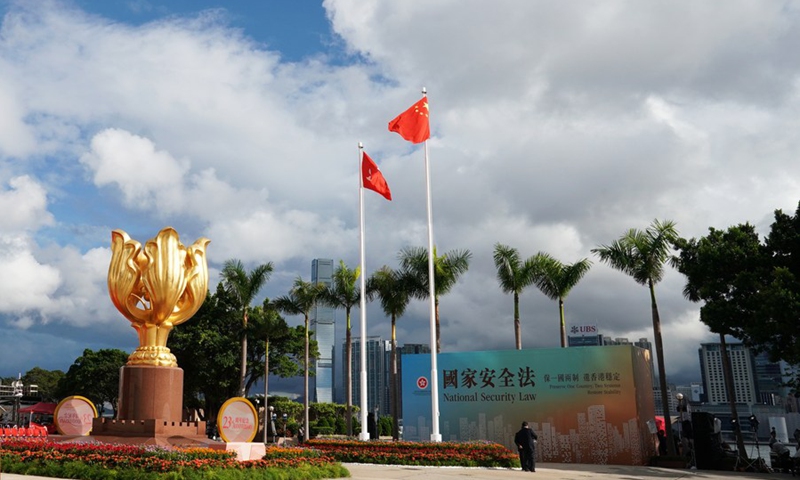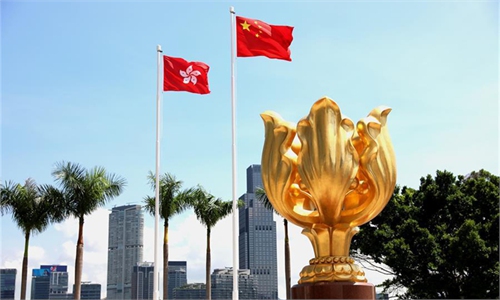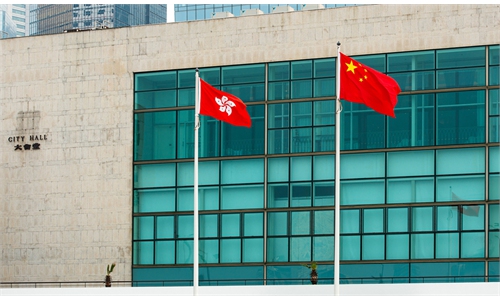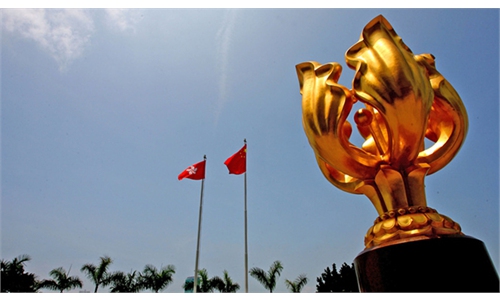HK electoral reform filters agents of external forces, uproots risk of 'color revolution'

Photo taken on July 1, 2020 shows the Golden Bauhinia Square after a flag-raising ceremony held by the government of the Hong Kong Special Administrative Region in Hong Kong, south China.(Photo: Xinhua)
The electoral reform in Hong Kong can root out the risks of "color revolutions" incited by external forces and their political proxies, and help Hong Kong shake off the endless political disputes and pressures under radical forces, Chinese State Council's Hong Kong and Macao Affairs Office said in a statement on Tuesday, after the country's top legislature approved the reform plan for Hong Kong.The amended Annexes I and II to the Basic Law of the Hong Kong Special Administrative Region was approved by the National People's Congress (NPC) Standing Committee on Tuesday.
Li Zhanshu, chairman of the NPC Standing Committee, stressed the principle of "patriots governing Hong Kong" so as to ensure the city's enduring peace, prosperity and stability, after legislators anonymously approved the amendments at the 27th session of the Standing Committee of the 13th NPC.
Chinese Ministry of Foreign Affairs spokesperson Hua Chunying also said on Tuesday that any attempts to interfere in Hong Kong affairs and coerce China are doomed to fail. The Chinese government has the resolve and confidence to safeguard national sovereignty, security and development interests, Hua said at the routine press conference.
Fan Peng, a member of the Chinese Association of Hong Kong & Macao Studies, told the Global Times that the electoral reform sets up a legal mechanism that can filter out individuals who would otherwise enter the political body as agents of external forces and disturb the governance of the SAR.
The reform, in coordination with the national security law for Hong Kong, will minimize foreign disturbance of Hong Kong's political environment and create a clear atmosphere for patriots to better administer the SAR, analysts said.
The Liaison Office of the Central People's Government in the HKSAR underscored the reform can help the SAR shake off political fights, better solve the economic and livelihood problems and get integrated into the big picture of national development.
Deng Zhonghua, deputy director of the office, told media that the reform closed loopholes in the current election mechanism, in line with the Constitution, the Basic Law and the decision of the NPC, and guaranteed the principle of "patriots governing Hong Kong."
Major changes in the amendments to Annexes I and II include expanding the election committee from 1,200 to 1,500 people, composed of five sectors.
The fifth sector, which includes Hong Kong deputies to the NPC, Hong Kong members of the National Committee of the Chinese People's Political Consultative Conference, and Hong Kong members of other national organizations, can consider problems at the national level, Deng explained.
The election committee was authorized to elect a major part of 90 legislative councilors and nominate candidates for Legislative Council (LegCo). Forty of the 90 LegCo seats were secured in this channel, while functional and geographical constituency seats were 30 and 20, respectively.
Deng said this change can make sure the LegCo represents the collective interests of Hong Kong society. The election base for LegCo members and executive chief will be the same to promote communications between administration and legislation.
In the new amendments, a committee was established to review the qualifications of election committee members and LegCo candidates, to guarantee the principle of "patriots governing Hong Kong."
Zhang Yong, deputy head of the Commission for Legislative Affairs of the NPC Standing Committee, noted "dual universal suffrage" is still the goal stipulated in the Basic Law and the direction of Hong Kong's democratic development.
Zhang said the next step of the electoral reform is local legislation in the HKSAR, which should accelerate the pace to guarantee smooth elections and functioning of LegCo. The arrangements should resonate the reform plan approved at the national level, and form a whole system that guarantees patriots governing Hong Kong and is suitable for the situation of the HKSAR.
HKSAR Chief Executive Carrie Lam said on Tuesday that, after NPC passed the amendments, three areas of work will follow in the SAR - public communication, local legislation, and arrangement of elections.
The HKSAR government aims to submit a draft in mid-April on local law amendments, and the amended bill is expected to be passed by the end of May and voters registered by June, she said. The city will hold elections for the expanded election committee in September, while LegCo elections will be held in December.
Major social organizations in Hong Kong from multiple fields, including the Chinese Manufacturers' Association of Hong Kong, the Real Estate Developers Association of Hong Kong and Hong Kong Federation of Education Workers, have welcomed the Hong Kong electoral reform plan, saying the reform measures are in line with the reality of Hong Kong and make people expect Hong Kong's future development.



